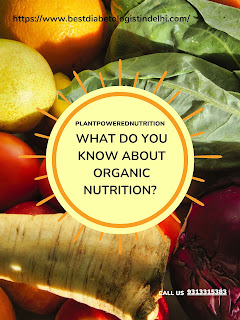PlantPoweredNutrition
bestdiabetologistindelhi.com have PlantPowered Nutrition is a health blog that helps readers who are living with best diabetes, as well as those who want to prevent it, by providing information on how food can help maintain blood sugar levels and weight.
Plant-Powered Vitamin B12: A Guide to Vegetarian Sources and Deficiency Prevention
#VegB12Sources #PlantPoweredNutrition #VitaminB12Deficiency #HealthyVegetarian #NutrientRichDiet
Introduction:
Embracing a vegetarian lifestyle offers numerous health benefits, but it's crucial to ensure you're meeting all your nutritional needs. Vitamin B12, an essential nutrient that plays a vital role in various bodily functions, can sometimes be a challenge for vegetarians. This guide explores the world of plant-powered Vitamin B12 sources, shedding light on how to prevent deficiency and enjoy a well-rounded, nutrient-rich diet.
The Importance of Vitamin B12:
Vitamin B12, also known as cobalamin, is essential for the formation of red blood cells, neurological function, DNA synthesis, and energy production. A deficiency can lead to anemia, fatigue, nerve damage, and cognitive impairments. While animal-based foods are rich in Vitamin B12, vegetarians can still obtain this crucial nutrient through carefully selected sources.
symptoms of Vitamin B12 deficiency:
Fatigue and weakness
Anemia
Neurological symptoms (numbness, tingling, balance issues)
Cognitive impairment (memory problems, difficulty concentrating)
Glossitis and mouth ulcers
Pale or jaundiced skin
Vision changes
Heart palpitations and shortness of breath
Digestive issues (loss of appetite, weight loss, constipation, diarrhea)
Dizziness and lightheadedness
Veggie-Friendly Vitamin B12 Sources:
Fortified Foods: Many food products, such as breakfast cereals, plant-based milk alternatives (soy, almond, or rice milk), and even meat substitutes, are fortified with Vitamin B12. Check labels to ensure you're choosing fortified options to boost your intake.
Nutritional Yeast: A staple in plant-based kitchens, nutritional yeast not only adds a savory, cheesy flavor to dishes but is also a good source of Vitamin B12. Sprinkle it on salads, popcorn, or pasta for an extra nutrient boost.
Plant-Based Yogurt: Some brands of plant-based yogurt, derived from soy or almonds, are fortified with Vitamin B12. Enjoy these as a creamy and nutritious snack or breakfast option.
Eggs: While not suitable for vegans, eggs are a source of Vitamin B12 for vegetarians. Including eggs in your diet can provide a natural and readily available source of this essential nutrient.
Cheese: Swiss cheese and cottage cheese contain modest amounts of Vitamin B12. Incorporate these into your meals for a flavorful addition to your nutrient intake.
Tempeh: As a fermented soy product, tempeh offers a small amount of Vitamin B12. It's also rich in protein and can be a versatile addition to your vegetarian diet.
Seaweed and Algae: Certain types of seaweed, such as nori, and algae like spirulina, contain Vitamin B12. However, be aware that the B12 in these sources is often in an inactive form, which may limit absorption.
Mushrooms: Varieties like shiitake and oyster mushrooms contain trace amounts of Vitamin B12. Including them in your meals adds flavor and a hint of this essential nutrient.
Fortified Plant-Based Beverages: Beyond plant-based milk, explore fortified fruit juices and meal replacement drinks that offer added Vitamin B12. These can be convenient ways to boost your intake.
Preventing Vitamin B12 Deficiency:
While these sources contribute to your Vitamin B12 intake, it's essential to take preventive measures to avoid deficiency:
Variety is Key: Incorporate a wide range of Vitamin B12-rich foods into your diet to ensure you're getting a diverse array of nutrients.
Read Labels: When purchasing fortified foods, check labels for the exact amount of Vitamin B12 per serving to make informed choices.
Supplements: Depending on your dietary habits and individual needs, your healthcare professional may recommend Vitamin B12 supplements to ensure adequate intake.
Regular Check-ups: Periodic health check-ups and blood tests can help monitor your Vitamin B12 levels and identify any potential deficiencies.
Conclusion:
A vegetarian lifestyle offers numerous health advantages, and with proper planning, you can meet your nutritional requirements, including Vitamin B12. By incorporating fortified foods, nutritional yeast, eggs, cheese, and other vegetarian-friendly sources, you can prevent Vitamin B12 deficiency and enjoy a balanced and vibrant plant-powered diet. Remember, a well-informed approach ensures that your vegetarian journey is not only delicious but also nourishing and fulfilling.




Comments
Post a Comment